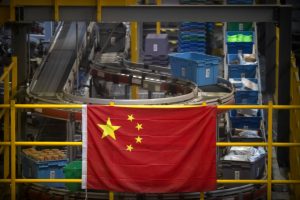President Donald Trump has identified China as the country’s biggest foe and the Justice Department mirrored that emphasis over the last four years with a drumbeat of cases against defendants ranging from hackers accused of targeting intellectual property to professors charged with grant fraud.
But even after a new administration arrives, the law enforcement focus on China may not look radically different, in part because of actions by Beijing that U.S. officials, lawyers, and analysts say run afoul of international norms. Even if the anti-China rhetoric is cooled in the White House, cases against agents of the Chinese government may well continue apace, especially since some of the focus — including against trade-secret theft — preceded the Trump administration.
“I think this is going to continue because it’s not really up to the U.S. It’s the Chinese who are being really aggressive,” said James Lewis, a senior vice president at the Center for Strategic and International Studies.
The Justice Department in 2018 launched what it called the China Initiative to combat what officials saw as a multi-pronged effort by Beijing to steal intellectual property and conduct foreign influence operations in the U.S. It was part of an administration-wide focus on China, which accelerated in the last year as Trump blamed the country for the spread of the novel coronavirus and as leaders of multiple agencies, including Secretary of State Mike Pompeo, delivered speeches blasting Beijing.
Department officials expect the focus to persist.
“There is no turning back the clock to an era when free market liberal democracies turned a blind eye to the PRC’s theft of intellectual property, appetite for sensitive personal data, and repression and censorship,” John Demers, assistant attorney general for national security, said in a statement, referring to the People’s Republic of China.
“The Department’s commitment to disrupt the illegal and predatory Chinese activity aimed at America and its allies, as illustrated in prosecution after prosecution, will not waver,” he added.
President-elect Joe Biden referred to China during the campaign as a “serious competitor.” As president, analysts expect him to make few major changes to U.S. policy in conflicts with China over trade, technology and security amid widespread frustration with Beijing’s trade and human rights record and accusations of spying and technology theft.
The Trump administration’s emphasis on China opened the president to criticism that he was trying to deflect attention away from Russia, which had interfered in the 2016 presidential election and which officials and experts regarded as the bigger threat for meddling in this month’s election. The Justice Department, for its part, did keep an eye on Moscow, unsealing an indictment last month that accused six Russian military officers in a global hacking campaign.
But most of the department’s high-profile actions have centered on China. FBI Director Chris Wray has said the FBI opens a Chinese counterintelligence case about every 10 hours. The Justice Department says it has charged more than 10 trade-secret theft cases tied to China since the China Initiative began.
In the last year, prosecutors charged Chinese hackers they said were working with the government with targeting companies working on coronavirus vaccine research, and accused others in a major hack of Equifax. The U.S. government also closed China’s consulate in Houston in July and charged six people in recent months with studying in the U.S. while hiding ties to People’s Liberation Army military institutes.
A particular area of emphasis has been on American college campuses and research institutions, where dozens of professors have been charged in cases that for the most part accuse them of failing to disclose research grants they had received from universities in China. A persistent concern is that professors enrolled in talent recruitment programs linked to the Chinese government are being used to steal research from American universities for Beijing’s economic benefit.
Peter Zeidenberg, a Washington defense lawyer who represents Chinese professors across the country, said that though he expected a new Justice Department to continue to prioritize intellectual property theft, he believes the China Initiative had “gotten so far badly off course” by targeting academics without any allegation that they had stolen research or passed along secrets. The scrutiny is causing professors to be summarily fired from universities, he said.
“The result is that a lot of really super-talented professors are having their lives wrecked unnecessarily. My hope is that they keep in mind the harm that they’re trying to prevent and then go after the people who are causing that harm,” Zeidenberg said of federal prosecutors.
“Because right now what they’re doing is entirely counterproductive to the United States’ interests because they’re decimating our science and technology, and alienating loyal citizens and scientists,” he said.
To be sure, the Justice Department had begun a focus on Chinese hackers well before Trump took office. It brought a first-of-its-kind indictment in 2014 against five Chinese military officers, accusing them of hacking into major American corporations to siphon corporate secrets.
The following year, President Barack Obama and Chinese President Xi Jinping announced that their countries had agreed not to conduct or support hacking for economic espionage. But China’s activities continued.
“I think there is broad consensus that individuals who engage in grant fraud and who fail to disclose foreign ties in violation of U.S. law pose a real risk to our intellectual property in the U.S. and to the integrity of our federal grants process,” said Justin Danilewitz, a former federal prosecutor and Philadelphia attorney.
“Regardless of what side one is on politically, I think that is going to continue to receive a lot of focus and attention,” he said.
Reporting by Eric Tucker from Washington, DC for the Associated Press.

































